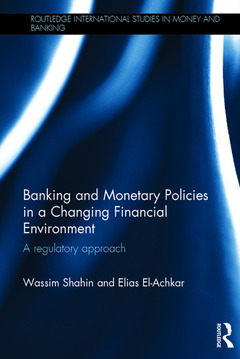Description
Banking and Monetary Policies in a Changing Financial Environment
A regulatory approach
Routledge International Studies in Money and Banking Series
Authors: Shahin Wassim, El-Achkar Elias
Language: English
Subjects for Banking and Monetary Policies in a Changing Financial...:
Keywords
Basel Iii; Banking policies; Basel Iii Accord; monetary policies; Unconventional Monetary Policies; financial crisis; FATF Recommendation; economic crimes; Latest Financial Crisis; bank governance; Asset Purchase Program; Basel 3; CDD; monetary unions; UK Bribery Act; central bank; Corporate Governance; foreign reserves; Terrorist Financing; international regulatory bodies; Gdp Growth; Quantitative Easing; FOMC; Money Laundering; Fiscal Union; Euro Area; Financial Services Firms; Price Stability Objective; Combat Money Laundering; Global Credit Crisis; Fund International Financial Statistics; MENA Country; Gdp Ratio; Exit Strategy; Qe Policy
Approximative price 178.41 €
In Print (Delivery period: 14 days).
Add to cartPublication date: 08-2016
· 15.6x23.4 cm · Hardback
Approximative price 53.83 €
In Print (Delivery period: 14 days).
Add to cartPublication date: 07-2018
· 15.6x23.4 cm · Paperback
Description
/li>Contents
/li>Readership
/li>Biography
/li>
The 21st century witnessed major changes in the financial environment surrounding bank regulators and banks. Banking and Monetary Policies in a Changing Financial Environment delves into three of these developments and challenges.
The first change in the financial environment relates to the rise in the number and sophistication of financial and economic crimes which shaped the international regulatory architecture. New rules and regulations led to the creation of new strategies to combat these crimes, especially those concerning the spread of more advanced money laundering methods and techniques, terrorist financing after the 9/11 attacks, and the proliferation of weapons of mass destruction. The second development concerns the global financial crisis of 2008 which drastically affected the regulatory environment of various international and domestic financial authorities causing major changes in bank lending and corporate governance policies, and in the development of the Basel III accord on capital adequacy for bank supervision. The third development manifests itself in the creation of a major European monetary union without a fiscal union and a giant European central bank impacting the conduct of monetary policy. This book combines theory, policy, regulation and institutional approaches with empirical testing, analyzing applications and case studies of various international regulatory authorities and administrations, countries and jurisdictions, central banks and commercial banks.
This volume is suitable for those who study international finance, Banking and white collar crime.
- Introduction
- The Changing Regulatory Environment Governing Financial and Economic Crimes
- Compliance of Worldwide Banking Systems with Evolving International Regulatory and Supervisory Requirements: Facts, Challenges and Implications
- Causes and Origins of Banking Crises: Review and Critique of Theory and Evidence
- Bank Lending During the Financial Crisis of 2008: An Empirical Investigation
- Corporate Governance in the Banking Industry and Basel III Challenges and Implications
- Monetary Policy in an Era of Quantitative Easing
- Monetary Policy in an Era of Monetary Unions, and Central Banks’ Holdings of Foreign Reserves
- Concluding Remarks and Policy Implications
Part 1: Banking Regulation to Combat the Rise in Financial and Economic Crimes
Part 2: New Policies in the Wake of the Latest Financial Crisis
Part 3: Central Banks in the New Era of Quantitative Easing, Monetary Unions without Fiscal Unions and the Holdings of Foreign Reserves
Wassim Shahin is Professor of Business Economics and Assistant Provost for special external projects at the Lebanese American University in Lebanon and served as the founding dean of the school of business in the same institution on its Byblos campus from 1996 to 2011.
Elias El-Achkar is Director of Research and Statistics at the Association of Banks in Lebanon and a university lecturer.
These books may interest you

The Oxford Handbook of Banking 152.43 €



